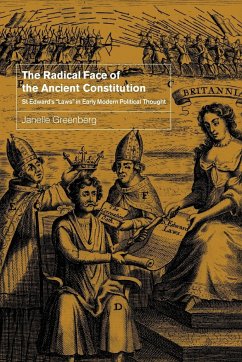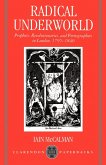The story of the 'radical ancient constitution' in English political thought, eleventh to the eighteenth centuries.
This book deals with the ways in which medieval and early modern historians, lawyers and politicians deployed their own national history to justify opposition to the English kingship. More particularly, it is a study of the origins and development of an historical construct called the 'radical ancient constitution', a version of the past which originated from sources including the so-called 'Laws' of Edward the Confessor. The book tells how a cult of kingship, centred around the Confessor's 'Laws', was transformed from a cult that sacralized the upstart Norman dynasty into one which desecrated the Stuart monarchy. In telling the story of the 'ancient constitution' the author reconfigures the historical landscape of early modern England and demonstrates that the so-called Whig version of history, far from being a concoction of seventeenth-century dissidents, enjoyed the sanction of medieval and early modern historians, scholars and lawyers.
Review quote:
'Greenberg's book is a very lucid and scholarly account of a subject that is of critical importance in English intellectual, political, and constitutional history. It is the fullest and best discussion of the history of ancient constitutionalism that has yet been produced.' Johann Sommerville, H-Albion
'Greenberg brings to greater prominence a number of authors whose contemporary impact we tend to underestimate - a fine scholarly study, which traverses the boundary of medieval and early modern studies in a manner which few could emulate.' The English Historical Review
'- an informative and provocative book, one of value to advanced students of early modern England.' Choice
'Greenberg has a flair for untangling tricky legal concepts - and explaining their relevance to political thought - lucid discussion -'. Royal Stuart Review
Table of contents:
Acknowledgments; 1. Hagiography and historiography: the long shadow of Edward the Confessor; 2. 'Those most equitable laws of St. Edward': from the cult of the Confessor to the cult of the Confessor's laws; 3. 'Divers and sundry ancient histories and chronicles': the articulation of the ancient constitution in the Tudor period; 4. 'By lex terrae is meant the laws of St Edward the Confessor': the footprints of the Saxons in the early seventeenth century; 5. 'You shall be king as while you rule well': the radical ancient constitution in the civil wars and the interregnum; 6. 'The noble transcript of the original contract, the Confessor's laws': the radical Ancient Constitution in the late Stuart period; Bibliography; Index.
This book deals with the ways in which medieval and early modern historians, lawyers and politicians deployed their own national history to justify opposition to the English kingship. More particularly, it is a study of the origins and development of an historical construct called the 'radical ancient constitution', a version of the past which originated from sources including the so-called 'Laws' of Edward the Confessor. The book tells how a cult of kingship, centred around the Confessor's 'Laws', was transformed from a cult that sacralized the upstart Norman dynasty into one which desecrated the Stuart monarchy. In telling the story of the 'ancient constitution' the author reconfigures the historical landscape of early modern England and demonstrates that the so-called Whig version of history, far from being a concoction of seventeenth-century dissidents, enjoyed the sanction of medieval and early modern historians, scholars and lawyers.
Review quote:
'Greenberg's book is a very lucid and scholarly account of a subject that is of critical importance in English intellectual, political, and constitutional history. It is the fullest and best discussion of the history of ancient constitutionalism that has yet been produced.' Johann Sommerville, H-Albion
'Greenberg brings to greater prominence a number of authors whose contemporary impact we tend to underestimate - a fine scholarly study, which traverses the boundary of medieval and early modern studies in a manner which few could emulate.' The English Historical Review
'- an informative and provocative book, one of value to advanced students of early modern England.' Choice
'Greenberg has a flair for untangling tricky legal concepts - and explaining their relevance to political thought - lucid discussion -'. Royal Stuart Review
Table of contents:
Acknowledgments; 1. Hagiography and historiography: the long shadow of Edward the Confessor; 2. 'Those most equitable laws of St. Edward': from the cult of the Confessor to the cult of the Confessor's laws; 3. 'Divers and sundry ancient histories and chronicles': the articulation of the ancient constitution in the Tudor period; 4. 'By lex terrae is meant the laws of St Edward the Confessor': the footprints of the Saxons in the early seventeenth century; 5. 'You shall be king as while you rule well': the radical ancient constitution in the civil wars and the interregnum; 6. 'The noble transcript of the original contract, the Confessor's laws': the radical Ancient Constitution in the late Stuart period; Bibliography; Index.








